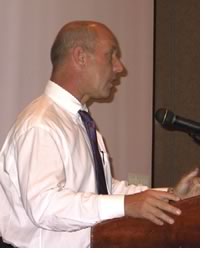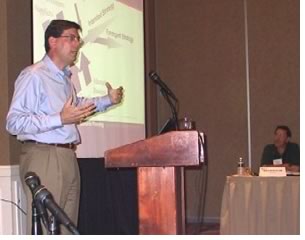

Texas Legislator Offers AIA State Government Network Lobbying Tips
 Relationships,
as well as campaign donations, are important to legislators, said Texas
State Sen. John Whitmire, speaking candidly with attendees of the AIA
State Government Network in Albuquerque. The Texas Democrat and the state
senate’s longest-serving member offered this and other insights
into how legislators respond to issue advocacy and the ways in which architects
can more effectively communicate with the people who represent them in
government.
Relationships,
as well as campaign donations, are important to legislators, said Texas
State Sen. John Whitmire, speaking candidly with attendees of the AIA
State Government Network in Albuquerque. The Texas Democrat and the state
senate’s longest-serving member offered this and other insights
into how legislators respond to issue advocacy and the ways in which architects
can more effectively communicate with the people who represent them in
government.
Whitmire called attention to five points when connecting with legislators:
- Legislators are like everyone else. They react to issues in much the same ways as do others.
- It is important for groups to reach consensus among themselves before a legislator will act on an issue. Legislators do not want to be perceived as taking sides and are hesitant in alienating groups. If an issue is too controversial, it is unlikely that a legislator will take action.
- Legislators work on the basis of relationships. They are more prone to act on behalf of individuals with whom they have formed friendships. For this reason, it is important to show good faith in all dealings and be perceived as an “honest broker.”
- Relationships and campaign donations are important to legislators. Having individuals from your organization show up at campaign events, district office hours, and other activities related to holding office is crucial to showing support and establishing a relationship. By demonstrating support for the legislator during the campaign season as well as in between campaigns, the legislator will be more willing to support your organization’s cause during the legislative session.
- Legislators are generalists who are not experts in many issue areas. They rely on the counsel of their staff and individuals with specific issue expertise to give them advice and information. It is important to build relationships with key staff people for this reason, as they are the people who make legislative and regulatory recommendations to the elected official. It is also important to remember that this is where a strong relationship between AIA members and a legislator comes into play. If a legislator likes you and trusts you, then he or she will likely rely on your advice and knowledge when making decisions that affect the architectural profession.
Money still talks
With monetary influence comes the ability to help elect politicians and
representatives who are going to be on your side when issues that affect
architects and businesspersons arise. “If you are trying to protect
your profession, your family, or anything else you care about, you can’t
make it without a political action committee, and lobbyists, and being
involved,” Whitmire said. Noting the soaring costs of campaigning,
Whitmire stressed the influence a group can have by bundling contributions
or by forming official political action committees. “Not many folks
can write a $1,000 check to a state senator’s campaign,” the
Texas politician said. “But you don’t have to be rich to make
a difference. If we go around the room, if everyone gave $10, you got
it.” Whitmire, who has served more than 30 years in public office
added, “I’d be lying if I didn’t tell you that I’m
going to remember who helped me get elected.”
 Whitmire
further advised to find an advocate in the legislature. “Find somebody
who, for whatever reason—either they know one of you or you helped
them get elected—who understands your issues, who will go in there
and argue for you. If you don’t have that you’re always going
to be starting a little bit behind . . . You’ve got to develop a
relationship—and it’s quite often not a quick fix—to
have somebody who carries your water for you. And they do that because
you’ve convinced them that you’re right and you’ve been
there for them when they’ve had a tough campaign.”
Whitmire
further advised to find an advocate in the legislature. “Find somebody
who, for whatever reason—either they know one of you or you helped
them get elected—who understands your issues, who will go in there
and argue for you. If you don’t have that you’re always going
to be starting a little bit behind . . . You’ve got to develop a
relationship—and it’s quite often not a quick fix—to
have somebody who carries your water for you. And they do that because
you’ve convinced them that you’re right and you’ve been
there for them when they’ve had a tough campaign.”
“Politics, like most things in life, is a two-way street,” Whitmire continued. “You help them get elected, you furnish the right information, and then they’ll become your advocates. And members of the legislature will even recognize that. We all develop expertise. Before you know it, if this legislator starts talking about your issue, and we know she knows what she’s talking about, we’re going to listen to her.”
Role of lobbyists
Questioned about the role of lobbyists, Whitmire stressed the need to
have smart lobbyists and advocates with integrity. He suggested that having
a lobbying team for areas of the state in which no architects reside,
particularly where there is a powerful elected official, may be a good
strategy for representing the interests of the profession in the state
legislature. Whitmire noted that, most of all, lobbying is a people business.
“It’s not like going in and building a rocket. It’s
not like working at a computer terminal. It’s walking into somebody’s
office and having the good sense to know whether they’re having
a good day or not. If they’re not having a good day, they’re
spread thin, get out of there. If they’re having a good day, you’ve
got somebody from their district they want to see, it’s a home run.
It’s really not rocket science. It’s being prepared and working
within the system.”
Final challenge
Noting that the many demands on his schedule prevent him from becoming
steeped in all legislative issues, he said it’s the AIA member’s
job to educate him on them and also to build relationships.
Whitmire challenged the meeting attendees to get in touch with their local representatives at all levels—from state representatives and senators to city council and school board members—and get to know them on a personal basis. He particularly suggested sending a personal handwritten letter, the most likely correspondence to be read by a politician. “We’re hungry for information. Before you know it, you’re a force.” Whitmire encouraged.
Copyright 2003 The American Institute of Architects.
All rights reserved. Home Page ![]()
![]()
 |
||
| For more information about the State Government Network, send an e-mail to the Government Affairs team. Texas State Sen. John Whitmire (D) addressed members of State Government Network in Albuquerque, where he, along with many of his Democrat colleagues, were staying in boycott of a special session on congressional redistricting. For more information on the AIA federal political action committee,
go to the ArchiPAC
page on AIA.org. Many of the AIA state components also maintain
PACs for state legislative races. For more information on whether
your state has a PAC contact your state component.
|
||